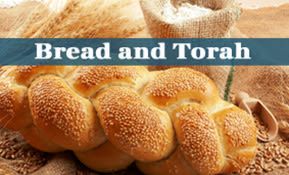
Tzav: The Four Who Give Thanks
Four types must publicly give thanks and serve as an example to appreciate the natural, societal, physical, and ethical boundaries that make life livable…

Translated and abridged by Rabbi Chanan Morrison
Parshat Tzav
One type of korban offered in the Temple was the Thanksgiving Offering (toda):
"This is the law of the peace offering ('Shelamim') … If offered as a thanksgiving offering, then it is presented along with unleavened loaves …" (Lev. 7:11-12)
Who brought this offering? The Talmud mentions several examples:
"Four need to give thanks: those who sail the seas, those who travel in deserts, the sick who become healthy,  and prisoners who become free." (Berachot 54)
and prisoners who become free." (Berachot 54)
Why did the Sages choose precisely these four situations as examples of individuals who need to publicly thank God?
Appreciation does not come naturally to us. The human soul is programmed to constantly strive for more. "The soul is never satisfied". (Ecclesiastes 6:7) Man looks ahead, not behind. We are always trying to improve our lot, to experiment and discover new horizons. It is more natural for us to take for granted than to take stock. True recognition and gratitude for what we have comes through contrast: only when we no longer have it, or hear that others lack, do we begin to truly appreciate it.
Another ramification of human characteristic to constantly strive is our tendency to challenge accepted rules. The testing of limits is particularly pronounced in the transitional periods (two-year olds in their transformation from babies to children, teenagers in their transformation from children to adults). While this challenging is necessary for individual and communal growth, certain restrictions may only be ignored at great risk. Generally speaking, there are four types of boundaries that people, in their quest for freedom and independence, attempt to ignore. They suffer the results of rebelling against natural or moral borders, and serve as a lesson to others.
The first group consists of those who attempt to defy the basic laws of nature that govern man. An example of this is one who abandons the land, risking his life by sailing the seas. Outside of his natural habitat, this individual will come to appreciate the safety and normalcy of life on land.
The second group includes those who rebel against the laws of the state. Rational fair governmental rules help regulate communal life. Those who abandon the rule of law by escaping to the desert (or the frontier) will quickly learn of the great necessity for law and order.
The third group are those who ignore the laws of personal care. Their interests and desires override the need to take care of their physical needs. Only when they suffer from sickness and disease do they come to appreciate the importance of rules of health and hygiene.
The last group are those who, in their greed for unfettered freedom, reject the ethical and moral laws of society. Their actions pose a threat to others in the community, especially the weak. They must be imprisoned to limit the harm they can wreak on society. Hopefully, they will come to the realization that it is better to settle for a restricted freedom outside the walls of prison, then no freedom at all.
These four types publicly give thanks — if they survive their folly! — and serve as an example to others to appreciate the natural, societal, physical, and ethical boundaries that make life livable.
(adapted from Ein Eyah II, p. 252)
* * *
Copyright © 2006 by Chanan Morrison
Rabbi Chanan Morrison of Mitzpeh Yericho runs http://ravkookTorah.org, a website dedicated to presenting the Torah commentary of Rabbi Avraham Yitzchak HaCohen Kook, first Chief Rabbi of Eretz Yisrael, to the English-speaking community. He is also the author of Gold from the Land of Israel (Urim Publications, 2006).










Tell us what you think!
Thank you for your comment!
It will be published after approval by the Editor.